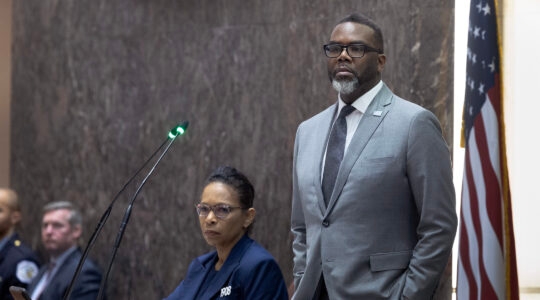(JTA) — Responding to a rising number of interfaith families, Conservative synagogues will be voting on a measure from their umbrella body that would allow congregations to admit non-Jews as members.
Currently, the United Synagogue of Conservative Judaism’s Standards for Congregational Practice restrict synagogue membership to Jews. But the new language, which congregations will vote on in March, would allow individual congregations to decide whether to grant membership to non-Jews.
“USCJ supports every affiliated kehillah in developing its own criteria for membership,” the proposed language reads, using a Hebrew word for “congregation.”
The proposed resolution grew out of a commission set up last March to explore ways to engage intermarried couples.
The official description of the new by-law says, “We celebrate the diversity among and within our kehillot and encourage the engagement of all those who seek a spiritual and communal home in an authentic and dynamic Jewish setting. We call on all of our kehillot to open their doors wide to all who want to enter.”
Rabbi Steven Wernick, United Synagogue’s CEO, told JTA on Friday that the current standards don’t make sense in a world where many intermarried couples are active participants in Conservative congregations. The new by-law, he said, is meant to separate between the communal matter of synagogue membership and the Jewish legal question of who is a Jew.
This does not change the Conservative definition of who counts as Jewish, he said. That matter remains the purview of the movement’s Jewish legal authorities, including the Rabbinical Assembly’s Committee on Jewish Law and Standards. Currently, the Conservative movement considers only someone who was born of a Jewish mother or who has converted to be Jewish.
“The language of ‘only Jews can be members of a synagogue’ makes it seem like a non-Jew who is connected is not a member of that community,” Wernick said. “What we’re trying to do with this is distinguish between community and covenant.”
The proposed by-law is the latest way in which the Conservative movement, which strives to remain loyal to Jewish law while embracing change, is grappling with rising rates of intermarriage among American Jews. The more liberal Reform movement welcomes intermarried couples in its congregations, while the Orthodox movement, citing Jewish law, does not.
The Conservative movement prohibits its rabbis from marrying or attending the nuptials of interfaith couples, though some of its synagogues celebrate intermarriages before they occur and welcome the couples afterward. In recent years, several Conservative rabbis have protested the intermarriage prohibition.
“I understand and I’m very sensitive and respectful to the anxiety about the domino effect,” Wernick said. “We’re living in a moment when paradigms are shifting, so the anxiety is very real, and the questions that come out of these paradigm shifts are also very real. Our job is to frame the questions and help our network navigate through this moment in history.”
Wernick said that many non-Jews are already de facto members of Conservative synagogues because their families have paid dues for family memberships. He dismissed the idea that this change would open the door to non-Jewish presidents of congregations, as it wouldn’t make sense for a non-Jew to want to lead a synagogue. But there are no plans, as of now, to pass a by-law formally restricting synagogue leadership positions to Jews.
“It’s a false premise that non-Jews are lining up to take significant roles within our synagogue and that the leaders of synagogues are eager to have non-Jews take on leadership roles,” he said.
The change has been endorsed by the major Conservative institutions in the United States, including the Rabbinical Assembly, the Jewish Theological Seminary and the Ziegler School of Rabbinic Studies.
“Our communities can and must grow stronger, and diversity within and among them will help to make them so,” wrote JTS Chancellor Arnie Eisen in a December endorsement letter. “Our fulfillment of the age-old covenant binding Jews to one another, to the world and to God, must be faithful to what sets us apart — and bold in bringing our tradition to bear in altered circumstances.”
JTA has documented Jewish history in real-time for over a century. Keep our journalism strong by joining us in supporting independent, award-winning reporting.





